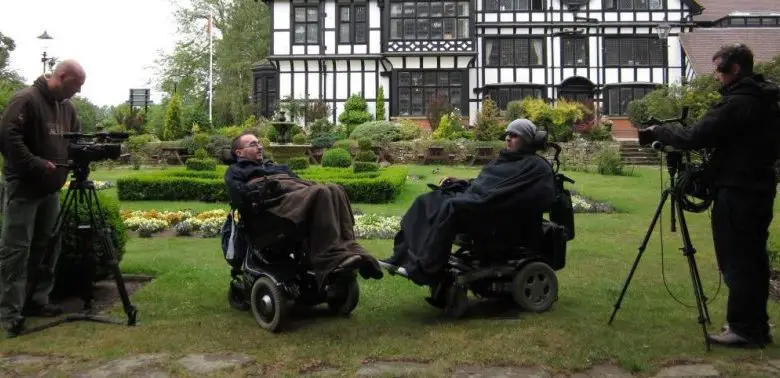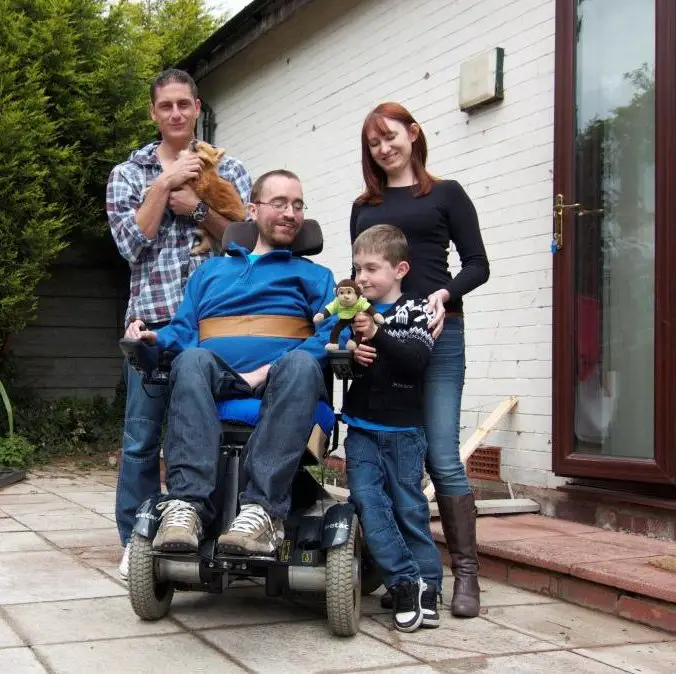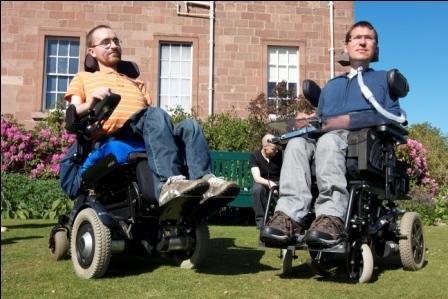
A life worth living: pushing the limits of Duchenne
The film A life worth living: pushing the limits of Duchenne is the story of academic, activist and now film maker, Dr Jon Hastie’s journey to meet other adults with Duchenne muscular dystrophy who are living productive, creative and fulfilling lives.
Living with Duchenne muscular dystrophy means living with a progressive, long-term health condition that presents you with a future of ongoing wasting of muscle until you are unable to move or even breathe without help. Indeed, for many parents of children recently diagnosed, it is a crippling blow from which some never fully recover.
With this in mind, one might think that a movie which documents the lives of adults living with this condition would be depressing, sad and bleak. But, in reality, the lives presented in A Life Worth Living are far more positive. These men show immense personal strength, adaptability and a determination to live their lives to the fullest extent possible, despite the day-to-day challenges they face. This story is about overcoming adversity, and creating a place for yourself in a world that is often disabling.
The idea for this movie came to me while sailing back from New York to Southampton on the Queen Mary 2, at the end of a month long trip. This represented a turning point in my own life, the culmination of a year of extensive planning for the most adventurous (and expensive!) journey I will ever take. It was for me the fulfillment of an ambition, and a reward for finishing 4 years of hard slog to complete a PhD in Environmental Politics.
In the closing stages of this journey I was presented with 2 options: either treat this as the pinnacle of my life’s achievements and settle in for the forthcoming decline in my own ability in as much comfort as I could find or I could move on to the next project, and dream bigger! My own personality meant that wasn’t really very much of a choice. In many ways, I enjoy the planning and hard graft of bringing a project to fruition as much as the final result of the project itself. In contrast, sitting around waiting to die sounded interminably dull.
I already knew, from planning my New York trip, that there were a number of people out there who, like me, have tried not to let Duchenne define their lives and achievements. Plus, I knew how comforting it had been for me to find out just a year previously that some people with Duchenne were still alive into their early 40s. Knowing all this made me intensely curious as to how other adults with Duchenne made this all work, but more importantly, made it clear to me that this was a story that others would want to hear too.
Drawing on recent disability road trip movies (including award-winners Darius goes west and 39 pounds of love), I decided to make a road trip movie following my journey to meet other adults with Duchenne. I knew the journey in itself was not going to be easy, requiring extensive planning to deal with the logistical challenges of transporting me, my carers and my equipment, plus the film crew and their equipment too.
Over the following year I started looking for people with Duchenne who were noted for various achievements beyond simply having the condition. The final cast totalled 6 people, including a digital artist, novelist and music promoter, all aged between 24 and 46.
On the advice of a friend in the film business, I then posted an advert for what I hoped to achieve on the film-making website Shooting People. This resulted in an overwhelming response and, after some research, I identified a director who shared a real passion for documentary and, having never encountered Duchenne before, was able to bring a fresh angle to the film that might appeal to the wider population.
Lacking substantial investment, I then began a two-pronged fundraising campaign to fund the costs of film production. On the one hand was an appeal via a Facebook page and dedicated website with regular video blogs for family, friends and the wider muscular dystrophy community to donate whatever they could to make the film a reality.
Alongside this was an appeal to charity and corporate sponsors to invest in a film, which could ultimately yield a financial return through embedded product placement and sales. This resulted in thousands of pounds of donations from some incredibly generous individuals inspired by the project, and investment from companies such as Etac and Brotherwood, who manufactured my wheelchair and adapted the car I use in the film. It also included funding from the charities Action Duchenne and the Muscular Dystrophy Campaign’s Trailblazers, who were given sales rights on the first batch of DVDs.
With the cast, crew and funding secured, filming began in June 2011 and lasted 2 and a half weeks. In that time, we travelled 2,200 miles, interviewed 6 adults with Duchenne, a young family whose son had been recently diagnosed and a renowned professor actively involved in providing medical care and advancing research for a cure for the condition.
The film we produced provides a revealing, honest and poignant glimpse into the lives of these remarkable men. No topic is off limits, we talk of the negative aspects of disability – dealing with anger and frustration, isolation and bullying at school – as well as more complex issues of family relationships, living independently, cultural views of disability, sex and relationships with partners, and dealing with the shadow of a shortened life expectancy. But, throughout, the positive attitudes and determination of these men shine through.
We see that, whatever situations these men are presented with, they are able to carve out a niche for themselves where they transcend the limitations of their condition. For those who receive personalised care and support to live independently, they are truly enabled to thrive, and establish for themselves a real life worth living.
By Jon Hasties
Check out…
• The Last Leg: what do you think?
• From a stage in Luton to a movie set in LA.
• Q&A with one-handed pianist Nicholas McCarthy.
Don’t forget to get in touch by emailing us at editor@disabilityhorizons.com, tweeting us @DHorizons or sending us a message on Facebook.

